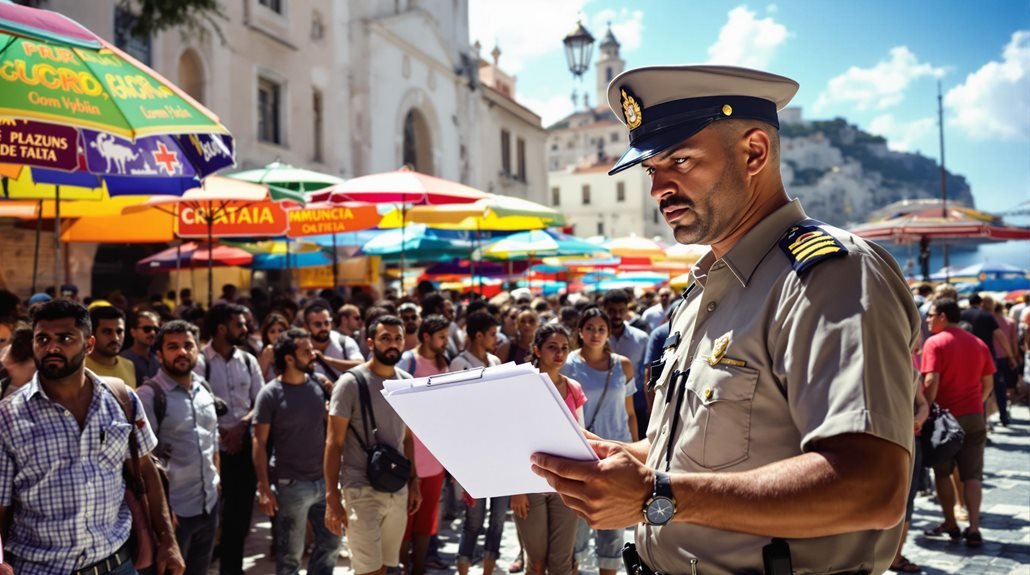Croatia faces significant challenges related to visa abuse by foreign workers, particularly from Bangladesh. The government has observed a high volume of unfulfilled work permits issued in 2023. In response, authorities have implemented stricter regulations and enhanced screening processes. This shift aims to uphold labor integrity while addressing ongoing demands for foreign labor. The implications of these actions could reshape future immigration policies and national workforce dynamics. What changes might lie ahead?
Alarming Statistics on Visa Abuse
As Croatia grapples with the challenges of managing foreign labor, alarming statistics on visa and work permit abuse have emerged, particularly concerning Bangladeshi nationals.
In 2023, Croatia issued 12,400 work permits to this group; however, 8,000 individuals never arrived, with only their luggage documented.
Of the 4,400 who did, approximately 50% found employment, highlighting significant visa exploitation.
Migration challenges extend to other nationalities, including Indian and Nepalese workers, yet violations are most pronounced among Bangladeshis.
This situation underscores a pressing need for enhanced oversight to mitigate further disruption in the labor market and uphold the integrity of immigration policies.
Government Response and Future Measures
The Croatian government has responded to the alarming statistics surrounding visa and work permit abuse by taking decisive measures to address the situation.
Key actions include enhancing bilateral communication with the Bangladeshi Embassy, emphasizing the need for corrective measures against misuse. The government has warned of potential indefinite visa suspensions if these issues persist.
Additionally, stricter recruitment regulations are aimed at preventing violations by employment agencies, which have been under scrutiny for their role in facilitating abuse.
These measures reflect Croatia's commitment to ensuring a legitimate labor migration framework while maintaining the integrity of its immigration system.
Enhanced Screening and Background Checks
In response to the rising concerns regarding the misuse of visas and work permits, Croatia's Ministry of the Interior has implemented enhanced screening protocols for applicants from high-risk migration groups, particularly targeting Bangladeshi nationals.
These new measures emphasize rigorous applicant verification to ascertain visa eligibility and deter misuse.
Key aspects of the enhanced screening include:
- Thorough background checks for all third-country applicants.
- Visa applications may be denied based on evidence of previous misuse.
- Increased monitoring of applicants' travel history to other Schengen countries.
These steps aim to restore integrity to Croatia's immigration process amid growing scrutiny of foreign worker policies.
The Future of Foreign Workers in Croatia
While Croatia continues to face challenges related to foreign labor, particularly concerning Bangladeshi nationals, the future of foreign workers in the country hinges on proactive measures and structured agreements to facilitate legitimate immigration.
As the job market evolves, monitoring migration trends will be essential to address worker shortages without compromising legal standards. Croatia's anticipated temporary limitations on specific nationalities may reshape its foreign labor landscape.
Enhanced cooperation among governments and recruitment agencies will play a critical role in restoring trust and ensuring compliance with immigration regulations.
Ultimately, a balanced approach will determine the viability of foreign workers in Croatia's economic development.
Frequently Asked Questions
What Are the Requirements for Obtaining a Croatian Work Permit?
To obtain a Croatian work permit, applicants must meet employment eligibility criteria, including industry-specific requirements, demonstrated job offers, and proof of qualifications. Compliance with immigration regulations greatly influences the approval process for potential foreign workers.
How Long Does the Visa Application Process Usually Take?
The visa application process typically spans several weeks, depending on application efficiency and individual circumstances. Factors such as documentation completeness and background checks greatly influence overall visa processing times for applicants seeking employment opportunities.
Can I Appeal a Work Permit Denial in Croatia?
Individuals facing a work permit denial in Croatia can appeal the decision. Effective appeals require understanding denial reasons, compiling relevant documentation, and submitting requests within prescribed timelines, ensuring compliance with outlined legal procedures for a favorable outcome.
Are Family Members Allowed to Join Foreign Workers in Croatia?
Family reunification policies in Croatia enable foreign workers to sponsor their family members. Visa sponsorship options must adhere to immigration regulations, ensuring compliance while promoting family unity within the migration framework established by Croatian authorities.
What Support Services Are Available for Foreign Workers Facing Issues?
Foreign workers encountering difficulties can access various support services, including legal aid organizations for immigration inquiries and community resources that offer assistance with employment rights, housing, and integration, enhancing their overall experience in the host country.
